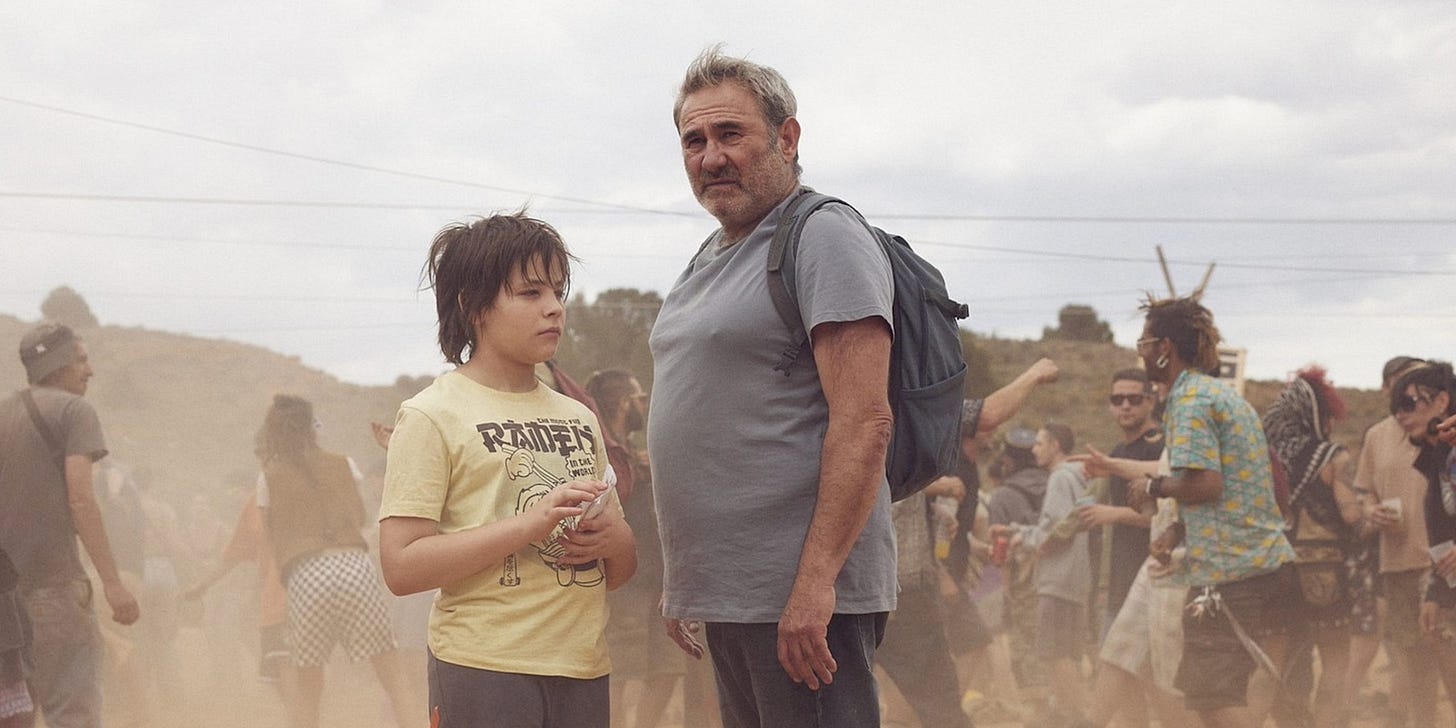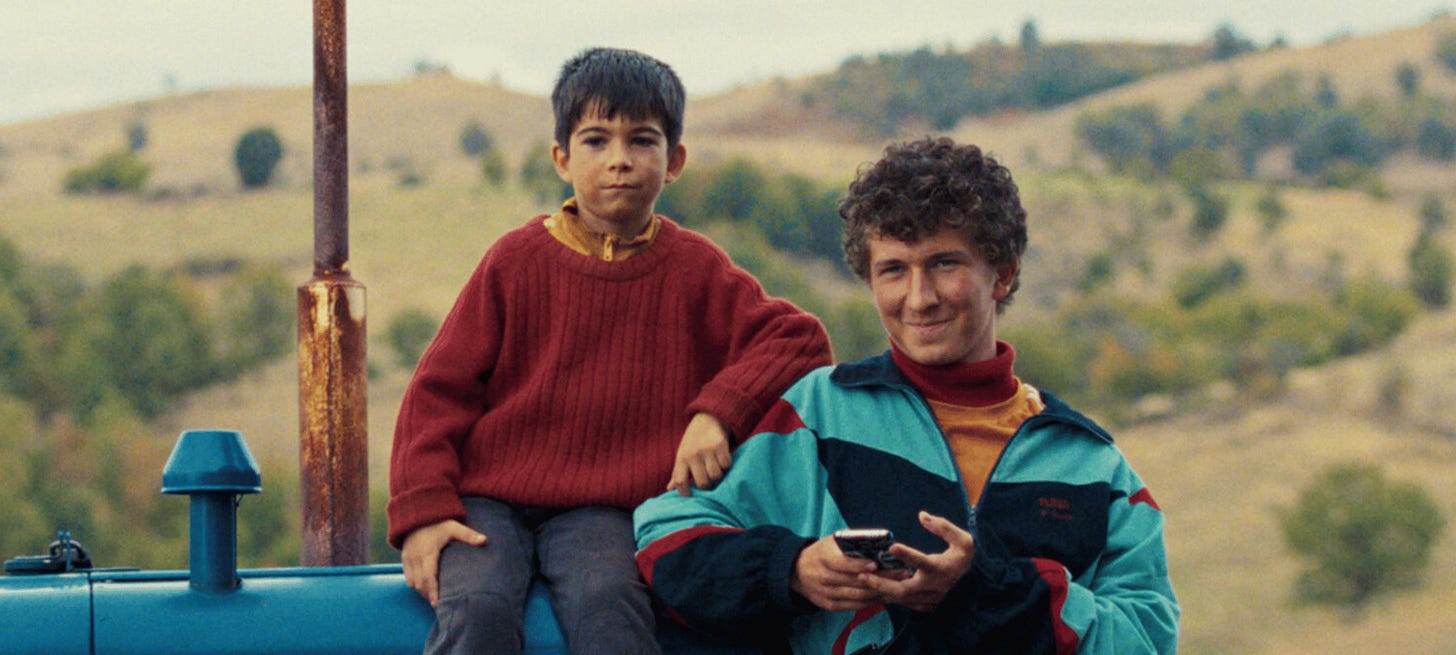London Film Festival: Week 1
Two indie darlings and two cinematic statements walk into a festival...
I have upped my game for this year’s London Film Festival (LFF) presented by BFI. I have accreditation! It’s been a minute since I experienced the stress/excitement of scheduling Press & Industry Screenings for a film festival, but as it’s only the beginning, I am way more stoked than anxious right now. Let’s see how I feel in a week.
Perks of accreditation means that my LFF starts early, with full access to pre-festival screenings. So while the official festival kicks off this week Wednesday (and ends on Sunday, October 19), I have already managed to see four films in the week that just passed.
Jump to a specific capsule review:
Sirât
Mad Max: Dreary Road
Oliver Laxe is a new voice for me, and what a first impression. His Sirât, the Jury Prize winner from this year’s Cannes, is a visually audacious gut-punch to the soul that left me with a weird mixed feeling. Fulfilled as a cinephile, empty as a human being. The film works as an allegory more than a literal reflection and the splashes of influence range from Jean-Paul Sartre and Albert Camus to Henri-George Clouzot (the nail-biting anxiety will trigger Wages of Fear PTSD) and George Miller. Not to mention one too many nights in Berghain, Berlin’s infamous techno nightclub where time and space invert through the eye of the sound system’s needle as you dance your demons away.
Plot in a nutshell
A father, accompanied by his son and their dog, searches for his missing daughter at a Burning Man-style illegal rave in the Moroccan desert. After realizing she’s not there, they decide to follow a ragtag group of ravers to the next party, across perilous mountainous terrain, in hopes of finding her.
Laxe uses the canvas of the barren landscape, at all times of day and night, and the brushes of the rib-cage-rattling atmospheric booming techno soundtrack, to paint a dire apocalyptic picture of the state of the world with image and sound. It’s malaise on acid, filled with transcendental cinematic moments. And then, just as you start to ask yourself ‘where is this all going?’ Laxe pulls off one of cinema’s greatest, impossible-to-predict shocks. I can’t recall the last time I physically recoiled in horror as I watched that moment. The second act is colored by this catastrophe, and as Laxe manages to pull more rugs from right under you, you’re left questioning everything, including ‘why I am doing this to myself?’
It’s the end of the world on a negative feedback loop. Filled with cinematic riches, devoid of much hope. See it once and probably never again.
DJ Ahmet
An antidote to Sirât
Giorgi Unkovski saved me in many ways. Watching DJ Ahmet right after Sirât restored some of my faith in humanity. Serendipitously, dance music is front and center in both films, but where it’s the soundtrack to existential dread in Sirât, it’s a symbol for life and freedom in DJ Ahmet. Conversely, Unkovski’s bucolic Macedonian fairytale doesn’t reach Sirât’s cinematic highs, but neither does it plummet down to its emotional lows. And so it was a much-needed tonic.
Plot in a nutshell
15-year-old Ahmet lives a simple life with his younger brother and dad in a north Macedonian village. All three are still mourning mom’s death in their own ways, when news arrives that Aya, a girl from the same village, has returned home from Germany to get married off. Forbidden love blossoms.
What I loved the most about DJ Ahmet, apart from the impressive performances, especially from the lead Arif Jakup, was the film’s playful treatment of Islam. A religion that has been propagandized into the monster lurking under all the beds in the West, is here being poked at for its patriarchal tendencies and rigorous rules. The village’s imam is the movie’s comic relief, and perhaps my favorite moment of all was an exchange between him and Ahmet, when he needed a password change. “’God is one’” comes the request. Ahmet tells him he can’t use the same password again, suggesting “God is one?”
It’s refreshing to see Muslim kids who aren’t portrayed as anything other than regular teenagers wanting to listen to shitty pop music, make cringe-inducing TikTok videos, and just live a carefree life.
There’s plenty more DJ Ahmet offers for a small move that’s not particularly layered or deep. Mostly, though, it has a heart the size of a small village and, in its own quirky way, celebrates freedom of thought and young idealism. And we could all use a bit of that from time to time.
Left-Handed Girl
The Taipei Project
Oscar-sweeper Sean Baker has had a big hand in the production of Shih-Ching Tsou’s Left-Handed Girl and you can see his fingerprints all over it. As the producer, co-writer and – most notably – editor of the film, Baker helps elevate this family drama to greater, more heartfelt, heights.
Plot in a nutshell
A mother and her two daughters, one of them just five years old, move back to Taipei, struggling to make ends meet with their noodle stand in the night market. When the father dies and the mother is forced to pay for all the costs, she hits even more dire straits. The five-year-old, after being scared into thinking her left hand is controlled by the Devil thanks to her superstitious grandad, decides to take matters into her own hand.
The opening credits glitter and glimmer through a kaleidoscope that young I-Jing (Nina Ye) is looking through, which sets the tone of the film just right (if a bit on-the-nose). The city of Taipei, a neon burst of constant traffic and the buzz of mopeds whizzing by, is a character onto itself – as our three protagonists deal with the struggles of the everyday. There’s an entire array of characters and tangential subplots, as Baker’s editing does the job of keeping the pace nice and relentless; scenes are cut into short bursts lasting no more than 20-30 seconds each, all culminating in a birthday party of the ages.
The concept of having most of the story play out from the perspective of a five-year-old, in impoverished circumstances, instantly recalls Baker’s The Florida Project, a film about the preservation of a six-year-old girl’s innocence who lives in squalor next to Disneyland. But there’s enough difference here – thanks to the uniquely Taiwanese pressures, traditions and superstitions, especially those carried by women – that makes Left-Handed Girl its own project. A beautifully performed, unassuming slice-of-city life drama that hits all the right feels.
The Secret Agent
A nostalgic treat for cinephiles
Kleber Mendonca Filho is cinema’s Brazilian jiujitsu master. It’s very hard to predict his next move and he always finds a way to twist and lock his audience into impossibly compelling stories and characters. I’ve always wanted to catch up on the rest of his filmography after watching and loving Aquarius at Cannes in 2016 but never managed to.
Now that I’ve seen his latest gem at the LFF, The Secret Agent, the feeling of needing to see all of this man’s movies is back again in full force.
Plot in a nutshell
Marcelo (Wagner Moura) is seeking refuge in his old hometown of Recife, running away from an old adversary back from his academic research days. As he interacts with others who are on the run for various reasons in the safe house, two men are hired to find him and kill him, and his mission becomes clear: escape the city safely with his son.
Similar to One Battle After Another, this is a 2hr 40m political thriller that absolutely flies by. From the opening scene, where Marcelo stops at the gas station and sees a dead body covered in casual cardboard - which the manager of the gas station nonchalantly dismisses as ‘one of those things’ – we are instantly sucked into Filho’s world of mischievous Brazil circa 1977.
At once a period piece, a political thriller, a police procedural, a family drama, a grotesque absurdist comedy and a loving ode to the power of cinema; The Secret Agent blends genres and styles into a delicious cocktail that has a lingering aftertaste of old movie spice. They just don’t make them like this anymore.
Wagner Moura (famous for playing Pablo Escobar in Narcos) delivers a quietly devastating performance that’s deceptively multi-faceted. A late appearance in the final act is especially mesmerizing in ways impossible to predict. No wonder he won Best Actor at Cannes this year, and if there’s any justice a first time Oscar nomination should also be in the cards.
See The Secret Agent as soon as you can.






Hi Nik, I'm reading with a grate pleasure all your comments/ reflections, about the fims. Thank you for that! You are reminding me, with every new comments, how we passionately used to wach films (all the family) in the past. 🙏🌹❤️